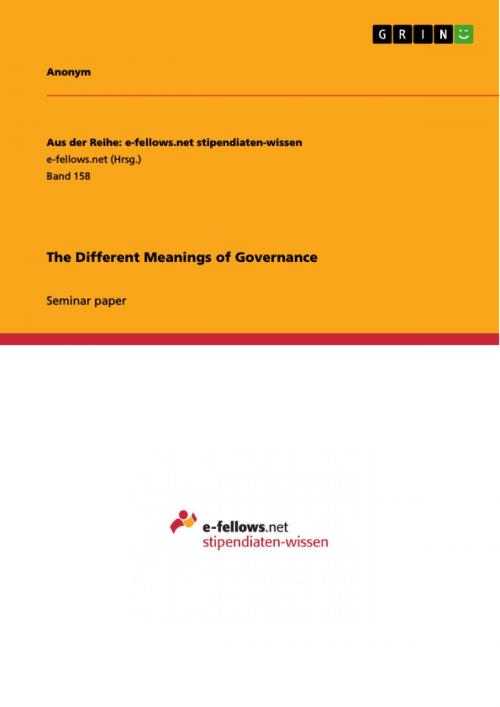The Different Meanings of Governance
Nonfiction, Social & Cultural Studies, Political Science, International, International Relations| Author: | Anonymous | ISBN: | 9783640974603 |
| Publisher: | GRIN Verlag | Publication: | August 3, 2011 |
| Imprint: | GRIN Verlag | Language: | English |
| Author: | Anonymous |
| ISBN: | 9783640974603 |
| Publisher: | GRIN Verlag |
| Publication: | August 3, 2011 |
| Imprint: | GRIN Verlag |
| Language: | English |
Seminar paper from the year 2010 in the subject Politics - Basics and General, grade: 1,00, Jacobs University Bremen gGmbH, language: English, abstract: Governance is more than an extensively used buzzword of social science literature over the last 20 years. Even though its manifestations have actually existed since the origin of human social thinking, it was not until recently that the concept was adopted, based on an understanding of the genuine realm of governance, encompassing the various facets of its existence. Consequently, work on governance reflects the interest of the social science community in a shifting pattern of governing styles (Stoker 1998). It is this vast array of phenomena related to governance, which creates confusion and misperception about its actual meaning. Rhodes (1997, 52) points to this problem as it 'would seem that governance has too many meanings to be useful'. Systemic, managerial, political and further dimensions of governance compete for a functional definition. Hereby, the meaning is often fitted to a context which does not reduce its ambiguity. Hence, academic literature on governance is eclectic and relatively disjointed (Jessop 1995). The theoretical roots are among institutional economics, international relations, organizational studies, development studies, political science, and public administration. Moreover, it can be interpreted as descriptive term, analytical concept, and normative constitution (Nuscheler 2009, 9). This essay, unconstrained by any context of a particular study discipline or academic field, investigates different meanings of governance in a more theoretical manner. It aims at discussing some of the most widely used applications of the concept of governance in order to identify diverging strands of meaning as well as common assumptions. For this purpose, the paper looks at governance interpreted as voluntary exchange in the political arena. It explores the meaning of governance as code for a minimal state, and it includes further the connotation of governance as good governance in a separate section. A final point will discuss corporate governance as yet another application field of governance from a business perspective. The main features of each of the four meanings will allow in the conclusion to assess in how far governance has a common understanding in social sciences.
Seminar paper from the year 2010 in the subject Politics - Basics and General, grade: 1,00, Jacobs University Bremen gGmbH, language: English, abstract: Governance is more than an extensively used buzzword of social science literature over the last 20 years. Even though its manifestations have actually existed since the origin of human social thinking, it was not until recently that the concept was adopted, based on an understanding of the genuine realm of governance, encompassing the various facets of its existence. Consequently, work on governance reflects the interest of the social science community in a shifting pattern of governing styles (Stoker 1998). It is this vast array of phenomena related to governance, which creates confusion and misperception about its actual meaning. Rhodes (1997, 52) points to this problem as it 'would seem that governance has too many meanings to be useful'. Systemic, managerial, political and further dimensions of governance compete for a functional definition. Hereby, the meaning is often fitted to a context which does not reduce its ambiguity. Hence, academic literature on governance is eclectic and relatively disjointed (Jessop 1995). The theoretical roots are among institutional economics, international relations, organizational studies, development studies, political science, and public administration. Moreover, it can be interpreted as descriptive term, analytical concept, and normative constitution (Nuscheler 2009, 9). This essay, unconstrained by any context of a particular study discipline or academic field, investigates different meanings of governance in a more theoretical manner. It aims at discussing some of the most widely used applications of the concept of governance in order to identify diverging strands of meaning as well as common assumptions. For this purpose, the paper looks at governance interpreted as voluntary exchange in the political arena. It explores the meaning of governance as code for a minimal state, and it includes further the connotation of governance as good governance in a separate section. A final point will discuss corporate governance as yet another application field of governance from a business perspective. The main features of each of the four meanings will allow in the conclusion to assess in how far governance has a common understanding in social sciences.















